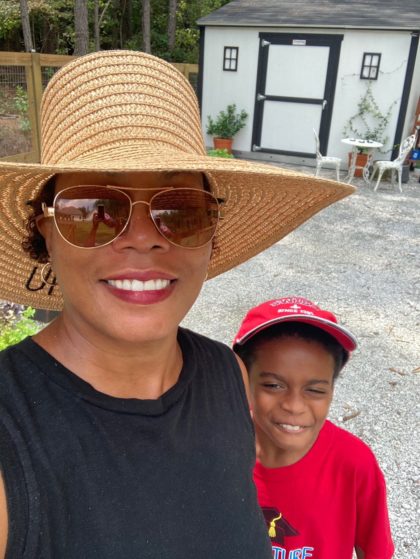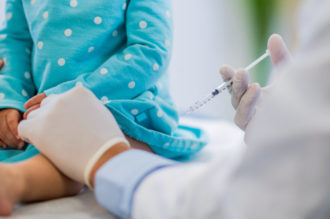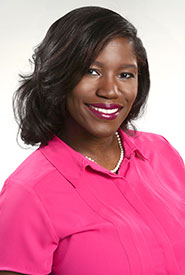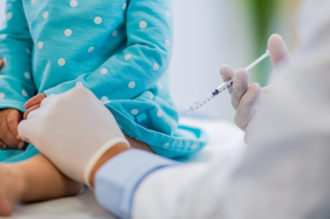By Ann Hardie
Some parents like Jil Hinds still just aren’t comfortable taking their children to the doctor.
Given that Georgia is a COVID-19 hot spot and now has more than 260,000 confirmed cases, Hinds feels even less comfortable taking her 9-year-old now than when the pandemic began.

“I just don’t trust that it’s safe,” said Hinds, who lives in Chattahoochee Hills. “My doctor’s office says it has put safety procedures in place, but I have this anxious, uncertain feeling of being in a closed environment that you didn’t clean yourself. They are checking temperatures, but you don’t have to have a temperature to have COVID-19. We know that someone can be a carrier and not have any symptoms at all.”
With her son at home doing virtual schooling instead of attending classes in person, Hinds isn’t concerned about putting off his immunizations. “I guess if they opened school back up and told me I had to get his shots,” she said, “that would get me to the doctor.”
Vaccination rates have plummeted during the pandemic as many concerned parents have steered clear of doctors’ offices.
Alarmed by that dramatic drop, public health experts and pediatricians are encouraging parents to get their children’s shots up to date. Getting current is critical to keeping many diseases at bay, they say, especially with flu season approaching.
“We don’t know how the coronavirus interacts with other viruses. The fear is that it could be really bad,” said Dr. Keyana Washington, a pediatrician with Gwinnett Pediatrics and Adolescent Medicine in Dacula.
The decrease in vaccination rates coincided with shelter-in-place and stay-at-home orders designed to halt the spread of the coronavirus. Many doctors canceled well-child visits, when children typically get their shots. In Georgia, though, pediatricians have been seeing a steady uptick in patients returning since restrictions have been relaxed and some children are heading back to school in person.
Dr. Sally Goza, president of the American Academy of Pediatrics, told GHN that orders for immunization doses through the Vaccines for Children Program – down during the first months of the pandemic — are now reaching the levels from last year.

“It is critical that children remain up to date on vaccines during this pandemic, as what we really don’t need is an outbreak of a vaccine-preventable disease as well,’’ said Goza, a pediatrician who practices in Fayetteville, a suburb south of Atlanta. “Children are still susceptible to all of the diseases we protect against with vaccines. Just because there is a COVID pandemic does not mean that other diseases have miraculously gone away.’’
Goza notes that general well-child visits are important for checking on growth and development as well as addressing any behavioral health concerns that the child’s parents may have.
Other diseases still dangerous
There are still plenty of skeptical parents. “Some are still fearful of coming into the office,” Washington said. “But I would venture to say that a pediatrician’s office is much safer than your typical grocery store.”
Although parents are worried about COVID-19, pediatricians and public health experts say they need to think about the other diseases that vaccines prevent — diseases such as measles, mumps and whooping cough.

An outbreak of measles among unvaccinated children led to at least 11 cases in Cobb County late last year. Dozens of local and state public health officials mobilized to contain the outbreak, the largest in the state in decades.
Disease outbreaks could lead to unnecessary medical visits, hospital stays and further strain on the health care system, according to the CDC.
“Hospital beds and other health care resources already are scarce,” Washington said. “The last thing we need is a measles or whooping cough outbreak in the midst of a pandemic with flu season coming.”
Physicians say parents need to think about protecting older children as well as the little ones. Teenagers typically are vaccinated to protect against diseases caused by human papillomavirus (HPV). “The main vaccine that we are concerned about protects against meningitis,” Washington said. “It is not a frequent disease, but it can be debilitating and often deadly.”

This year, getting a flu shot is actually more important than ever, doctors say, especially since the flu and COVID-19 share many of the same symptoms. “With them hitting at the same time and being very similar in their presentation, the more people we have vaccinated against the flu, the easier it is for us to determine which they have,” said Dr. Andrew Doyle, a pediatrician with Wellstar Health System who works in Holly Springs. “The flu vaccine also will protect patients from the flu, so they don’t have these two diseases that could both be very serious on top of each other.”
Doyle understands parents’ reluctance to go to the doctor during the pandemic. “I am a parent. My wife and I had these same conversations,” he said. “Physicians’ offices across are doing all they can to keep patients safe. We are just as concerned about keeping everyone healthy as anyone else.”
The benefits of getting vaccinated far outweigh the risk of going to the doctor, he said. “Vaccines have proved over history to be the most effective means for keeping people healthy and well. The diseases we vaccinate for still exist in the world and if you don’t get vaccinated for them, you are going to be at risk of getting them.”
Kristy Favalli of Atlanta has a lot of faith that her pediatrician’s office is doing all it can to limit exposure to the coronavirus. Even so, she still is uneasy about taking her three young daughters there. “My husband and I have been trepidatious about going anywhere, but especially to the doctor,” said Favalli, whose girls are 4, 2 and 11 months old. “With kids as small as mine, I knew they were going to be touching every door handle, every single solid surface.”
After the pandemic first hit, Favalli delayed her children’s routine check-ups and vaccinations for several months, hoping that the virus would die down. When the opposite happened, she gave in and made the appointments — but not all at once. She took the children individually so she could better control what they would get into, and they received their shots.
“Every week, I would think, we are going to get better news,” Favalli said. “When I realized that the virus was going to stick around for a long time, I decided there are certain things that have to be done and this is one of them.”
Ann Hardie is a freelance journalist based in Atlanta.

